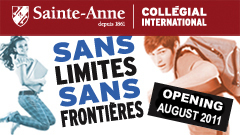A very 21st Century challenge is integrating the phenomenon of information technology and the use of web 2.0 tools into the curriculum of today’s students. One result is that more and more colleges are introducing laptops into their classrooms. At Cégep de Rimouski, a laptop project is being tried in the Natural Science Technology Program. The Cégep régional de Lanaudière in L’Assomption requires all students in technical programs for accounting and management and the certification programs for Insurance and Financial Services counsellors to have a laptop as well.

Collégial international Sainte-Anne
The new Collégial international Sainte-Anne, a private college in the west of the Island of Montreal requires all students, whether enrolled in Natural Sciences or Social Sciences to have a laptop for the duration of their studies.
The digital natives are coming mobile phones in hand, laptops stashed in backpacks, equipped to cope with all situations. To meet the educational needs of this generation, Collégial international Sainte-Anne is offering a leading-edge technology-enriched environment enabling teachers and students to excel. Furthermore, IT integration is fueling a curriculum reform using innovative teaching methods to promote learning.
This approach involves three general goals: the provision of technological equipment, the development of students’ IT skills and the support of teachers.
To make our courses more dynamic, we favour active learning. Interactive projectors, touch tablets, student laptops and e-textbooks are tools that can enrich lessons and encourage students to become active participants in their own learning. We have chosen a blended learning model that mixes attendance of on-site courses with online access to content (notes, exercises, attachments, videos) via a learning platform (Moodle or Lea at the discretion of the teacher).Those teachers that desire to do so can record some or all of their classes using cameras installed in classrooms. These online learning capsules allow students to better understand or review the concepts taught in their classes.

Collégial international Sainte-Anne
The skills of the collegial IT Exit Profile have been integrated into the curriculum and associated with their most appropriate courses. They will be progressively evaluated over a two year period. An IT skills test has been completed by students to determine their level of computer knowledge upon their arrival at the college. Video learning capsules will be created by a group of students, and make-up courses to upgrade skills will be offered to encourage the development of advanced computer abilities using the resources of InukTIC. At the end of their program, students will be evaluated and certified using a digital portfolio containing work contributed throughout the duration of their college education.
The key to the success of our project is in the training and support of our teachers. Several resources contribute to the development of innovative IT integration projects. The use of a dynamic planning and analysis grid for of academic activities developed by Christian Barette, presented in Nicole Perreault’s recent column, favours a structured approach and ensures successful educational IT integration. APOP and Performa are full of resources providing training and access to communities of practice. A common preparation time was scheduled into teachers’ schedules at Sainte-Anne to promote exchanges and the sharing of ideas. Meetings, based on the model of a professional learning community advocating an active approach, based on reflection and collaboration are planned on a regular basis. In addition, an educational consultant in ICT integration has been hired to to support teachers. Everything is in place to engage staff in an ongoing professional development process.
At Collégial Sainte-Anne, technology enriches traditional teaching methods and promotes the development of autonomy and critical thinking in students all within a bilingual environment (Although English occupies an important place in courses and extracurricular activities,it should be noted that the main language of instruction is French.). The integration of ICT programs will create an innovative spirit and greater openness to the world while putting the student in a collaborative learning environment based on shared knowledge.
How is your college preparing to host Generation C? Is a laptop program on the horizon?

